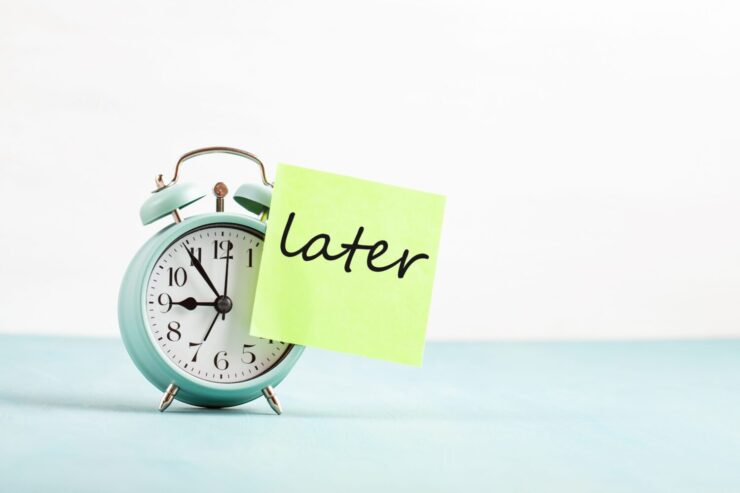Ever found yourself fixating on a goal, only to find inertia gripping you tight, rendering you motionless towards its attainment? Why does this happen? Procrastination, that relentless adversary, ensnares many in its coils: a crucial task looms, yet we defer, succumbing to worry and guilt.
This draining cycle saps our vitality, prolonging the task’s postponement as our strength dwindles. In this article, we delve into the query, “Why do people procrastinate?” We explore procrastination’s symptoms and unveil strategies to conquer it, paving the path to productivity.
Symptoms of Chronic Procrastination

What exactly is procrastination? In psychology, it denotes the inclination to defer working on a specific task until its deadline, opting instead for less pressing, more gratifying, or simpler activities, thereby detrimentally affecting productivity.
The primary indicators of procrastination encompass:
- Intentionally delaying task completion.
- Deviating from agreed-upon plans.
- Tackling trivial, non-urgent tasks that could easily be postponed.
- Flitting chaotically from one task to another.
- Experiencing unpleasant emotions due to missed task deadlines (anxiety, self-recrimination, restlessness, diminished mood).
- Hastily completing the entire workload in the final moments.
- Deferring essential decision-making.
- Struggling to prioritize tasks.
- Succumbing to perfectionism.
Causes of Chronic Procrastination
Procrastination transcends mere time management; it’s fundamentally an emotional challenge. The core motivation behind procrastination lies in seeking relief from discomfort—be it boredom, fear, anxiety, or frustration—associated with a task. People often procrastinate to sidestep these immediate negative emotions, often at the expense of long-term goals.
Potential causes of procrastination encompass:
Fear of failing
When apprehension looms regarding the success of a new business venture or undertaking, avoidance mechanisms kick in. Procrastination, in this context, becomes a shield against anticipated psychological distress.
Anxiety and stress
With a staggering 94% of American employees reportedly experiencing workplace stress, anxiety and stress can significantly contribute to procrastination. Symptoms such as intrusive thoughts and physical manifestations of anxiety can impair one’s ability to tackle impending tasks.
Lack of motivation
At times, procrastination stems from a straightforward lack of motivation. This occurs when the anticipated rewards—be it financial incentives, promotion prospects, or recognition—aren’t compelling enough to spur action.
Perfectionism
Perfectionists often delay task completion out of fear that the outcome won’t meet their exacting standards. This fear of falling short inhibits action, as perfectionists struggle to reconcile the possibility of imperfect results.
Genetics
Research, such as that conducted by The National Center for Biotechnology in the U.S., suggests a hereditary component to procrastination. Conditions like attention deficit hyperactivity disorder (ADHD), which hampers concentration, can manifest as procrastination tendencies.
How to Overcome Chronic Procrastination

Procrastination can easily derail our best plans. Here are the top 5 strategies how to get rid of stress and stop procrastinating:
1. Embrace the power of the tiny start
Take a deep breath and just begin, even if it’s for a mere 15 minutes. Set a timer if needed, and watch the momentum build as you overcome the initial hurdle. Often, the hardest part is simply starting, and you might wonder how much you can do in a short burst.
2. Break the tasks into smaller steps
Feeling overwhelmed by a bunch of tasks? Break the big challenge into smaller, more manageable steps, creating a roadmap to completion. Such division is one of the best stress relievers. This way, your brain won’t be intimidated by the huge size of the work, and you’ll see steady progress as you tick off each completed step.
3. Organize for action
What are other ways to relieve stress and stop procrastinating? It is advisable to have a to-do list with priorities and deadlines and utilize a time management system to track your progress. Eliminate distractions by silencing notifications and putting your phone away.
4. Spark your motivation engine
Sometimes, a lack of motivation fuels procrastination. If you feel down and looking at how to relieve stress, reframe your perspective and find the value in the task at hand. Reward yourself for completing milestones, big or small. For example, these can be a cup of coffee going out with a friend after accomplishing a difficult task.
5. Turn for professional help
Procrastination doesn’t make you lazy; it’s often a symptom of deeper issues like stress, fear, or negative self-beliefs. Be more kind to yourself. If procrastination persists, consider exploring the root causes and seeking professional guidance if needed.
If you are procrastinating and looking for ways to reduce stress and anxiety, try to use solutions to enhance productivity, like the TodayIsTheDay app. It will help you achieve real progress in overcoming procrastination.
This web app is based on CBT (Cognitive Behavioral Therapy), a scientifically grounded approach to changing negative thinking patterns. The TodayIsTheDay application will be your assistant in managing tasks and self-organizing, and it has been proven by many satisfied users.
Final Thoughts

In your journey to conquer procrastination, persistence is key. Understand that setbacks may occur, but they do not define your ultimate success. With each effort, you strengthen your resolve and inch closer to breaking free from the grips of procrastination.
Stay committed to your journey of self-improvement, and celebrate every small victory along the way. Remember, the path to productivity is paved with determination and resilience.

